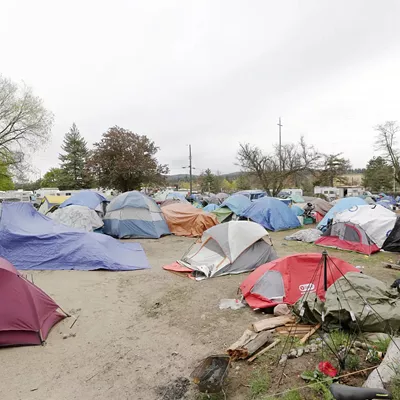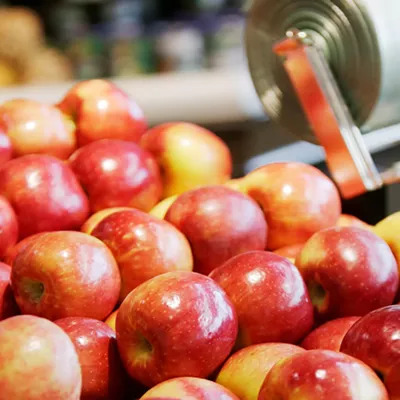That said, the Festival of Fair Trade is also about buying neat stuff in harmony with certain values that often get overlooked by monolithic, multinational retail corporations in their frenzied veneration of the bottom line. "Fair traders" -- as they call themselves -- assume the propriety of livable wages, healthy and dignified working conditions, responsibility toward the environment, sustainable development for foreign producers, and the preservation of cultural identity. When fair traders tout their colorful and exotic wares this weekend at the Community Building, they tout these principles alongside them. So not only do you get handmade stuff from really hot countries like Mali, Nepal, Chile, Guatemala, Mexico and Vietnam, you also get a squeaky-clean conscience, because none of it comes from sweatshops that exploit child or slave labor.
"We're trying to get back to the fundamental concept of trade -- that being a mutually beneficial arrangement," says Denise Attwood, owner of Ganesh Himal Trading and organizer of the festival. "What fair traders do is look at the long-term, sustainable health of the producers as part of their bottom line," she says. "It's not just about making a profit, it's about working with people in a way that benefits everyone along the chain of trade, including the ultimate consumer."
The problem that Fair Trade addresses, according to Attwood, is that big retail corporations often pit foreign producers against each other in merciless rounds of bidding. Desperate for work, they are often forced to undercut one another's prices until they are working for bare sustenance. Also, she says, large corporations have a tendency go into a region when it suits them, stockpile some products, and then leave the foreign workers high and dry when contracts are fulfilled or when pesky regulations impose on their business activity. In other words, they're not invested in the foreign communities that provide their cheap labor.
U.S. wage and labor laws are meaningless in China, as they are in many developing countries that Western retailers tap for labor-intensive manufacturing. Attwood says that "Fair traders talk to producers and ask, 'What is it that you need to make on this product, to feed and house your kids, and send them to school, and do everything that a human being wants to do?'"
Organizations like the Fair Trade Federation (FTF) facilitate this goal. They review the practices of potential members by committee, and grant membership to importers who meet certain criteria. They have also developed a marking system for fairly traded goods, which serves the dual purpose of assuring consumers and raising awareness. You may see the logo on some of the items for sale this weekend at the Festival of Fair Trade.
Among the local fair trade vendors participating in this year's festival are Ganesh Himal Trading, Global Folk Art, Moonflower Enterprises, Singing Shaman Traders, ConoSur Imports and the Fabric of Life. Holiday shoppers looking for unusual gifts -- as well as compulsive shoppers who merely exploit the frenzy of the season -- will find all manner of imported and handcrafted knickknackery. Which brings us back to point one: Really, it's all about fun shopping.
A whirlwind tour of Global Folk Art reveals lots of coffee, olive oil produced by Arab farmers in West Africa, organic herbal blends, stylish pottery, teapots with matching cups, lots of decorative and lidded baskets, wooden stools nicely painted, a globe fit for an executive's office, wall mirrors, posters, woven things aplenty, home d & eacute;cor items, drums, handcrafted figurines, glasswork, silken things, earthy wall-hangings, African masks, intricate tapestries, shirts, T-shirts, skirts and dresses, screen prints, hats of all kinds, belts of leather, belts of beadwork, and a walking-stick from Kenya carved from a single piece of wood with animals standing one on top of another up to the handle. (Hasn't your uncle Bob been hinting for one of those?)
There are Chilean flowers made from wood, candle holders, wooden chests, wooden toy trucks, pillows, bamboo wind chimes, gloves and scarves, elaborately embroidered handmade purses and wallets, with brilliant designs of stripes and diamonds and flowers. Finger puppets! There were also playful marionette dragons and horses, brass bells and Buddhas, incense, meditation pillows, and a sweetly resonant gong hanging from a little Chinese pagoda.
"You won't see fair traders in the top five of Fortune 500 companies," Attwood says, noting that most are small businesses. "We don't work in the arena of being beholden to stockholders."
According to the FTF, fair trade sales amount to $400 million per year, globally. That's about 0.01 percent of all sales worldwide. Not much, but there's hope. Remember: Sam Walton started small, too.
The Festival of Fair Trade runs Friday-Sunday, Nov. 24-26, from 10 am to 6 pm. Free. Community Building, 35 W. Main Ave. Call 448-6561.















